It was rare. They were there. But they don’t remember it at all.
A group of Swifties have taken to social media to share that they have no recollection of attending the singer’s Eras Tour, which kicked off in March 2023 and celebrates Taylor Swift’s discography through three-hour-long shows.
“Post-concert depression? No, post-concert amnesia, because why do I not remember the Eras Tour at all? I was there, and I know it was the time of my life, but why do I not remember it?” a fan who attended one of Taylor’s shows in Australia wrote on TikTok on June 3.
Multiple Taylor Swift fans, known as Swifties, have reported experiencing “memory loss” after attending the singer’s concerts
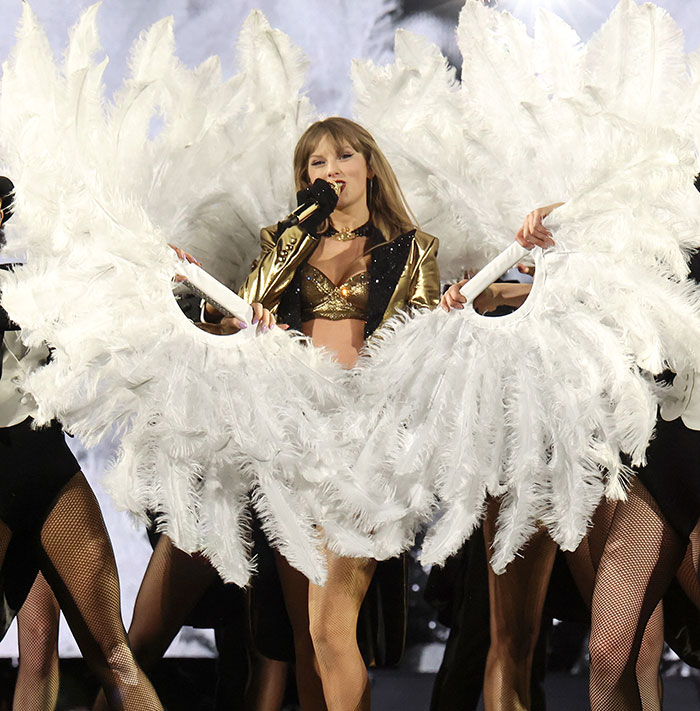
Image credits: Kevin Mazur/Getty Images
“I only saw her two weeks ago, and I can’t even remember it,” shared another on May 23. “I can’t remember following her with my eyes on the stage. It’s all gone. I can only remember things from watching them in videos afterward. And I’m just telling myself that those are my memories, but they’re not.”
Some Swifties said they could vividly remember the details of their trip to the venue and their journey back home, but the concert itself was a blur in their memories.
However, while many have reported experiencing “post-concert amnesia,” these claims actually contribute to the trivialization of a serious condition.
Swifties have referred to the strange phenomenon as “post-concert amnesia”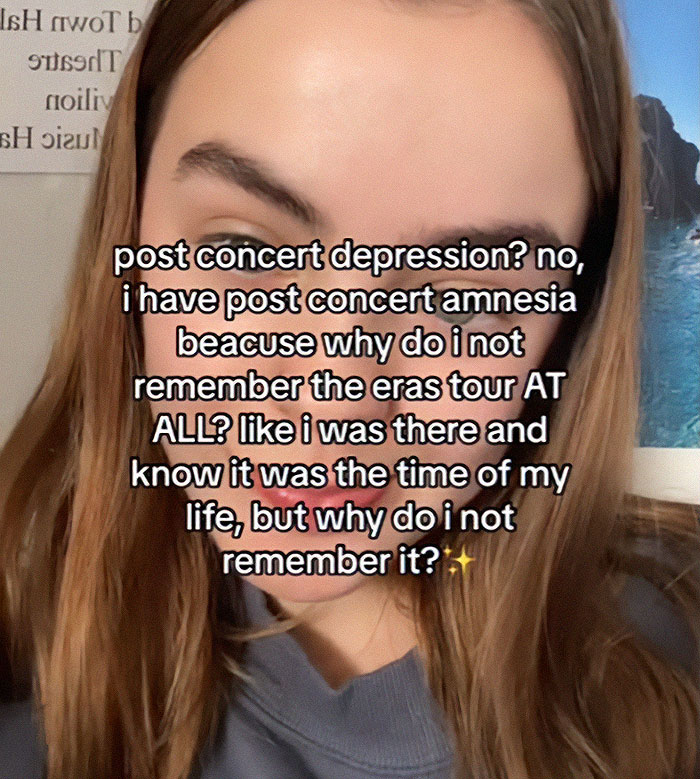
Image credits: champaigeproblems
It’s true that people can have gaps in their memories for short periods of time. A rare condition known as transient global amnesia (TGA) is characterized by sudden episodes of memory loss. During a TGA episode, people can’t form new memories (a condition called anterograde amnesia) and have difficulty recalling recent memories (a condition called retrograde amnesia), as per the Cleveland Clinic.
Those who experience TGA episodes remember who they are and can remember their friends and family members. They can still perform complex daily tasks, such as cooking or driving. However, they may not know where they are or the day or time, the medical center adds.
“I literally don’t remember anything. Eras Tour amnesia,” a concerned fan wrote online
@clare.marie56 THANK GOD FOR VIDEOS I TOOK 🥹 but seriously its a blur!!! #taylorswift #theerastour #anfieldN2 #fypシ゚viral #fyp #eras ♬ original sound – ellie
This situation likely doesn’t apply to the concert experiences of Swifties, experts say.
“TGA is a very stereotyped condition, characterized by loss of memory retrieval during the episode as well as impaired memory encoding. Thus, the individual asks questions about recent events in a repetitive manner. In this case, that should have occurred during the concert itself and would have been noticed by others around,” Dr. Christopher Butler, a neurologist at the Imperial College London, told Bored Panda.
Taylor Swift’s Eras Tour kicked off in March 2023 and celebrates the popstar’s discography through three-hour-long shows

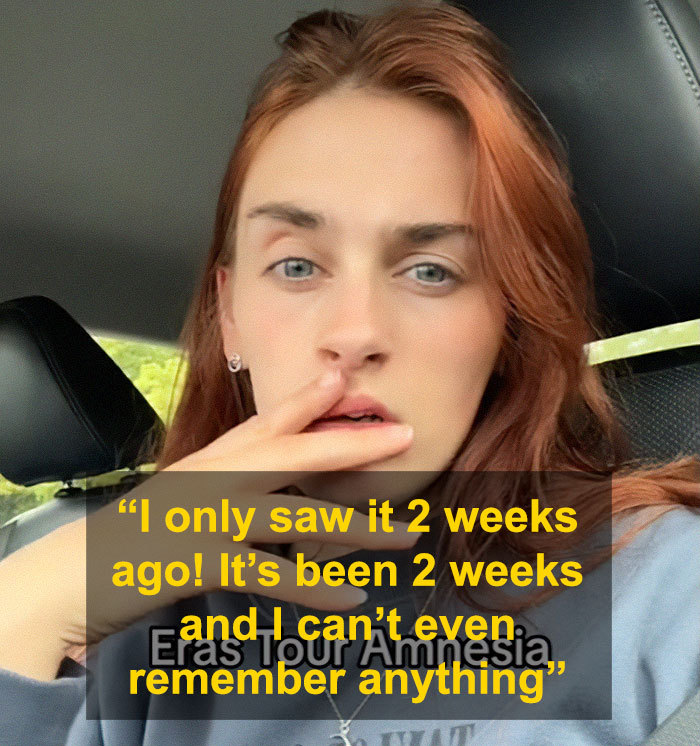
Given that most Taylor Swift fans are millennials, people between the ages of 28 and 43, it’s highly improbable for them to be affected by transient global amnesia (or what they call “post-concert amnesia”).
“TGA almost exclusively occurs in people in their 50s, 60s, and 70s,” Dr. Butler further explained.
“Finally, TGA is rare and certainly not contagious. The chances of multiple people having it at the same time in the same place are next to zero.”
According to the Cleveland Clinic, the condition affects about 5 to 10 people per 100,000 per year in the general U.S. population.
“I can only remember things from watching them in videos afterward. And I’m just telling myself that those are my memories, but they’re not,” shared another fan
@laurenlmarshall Did anyone else black out for 3.5 hours?? @Taylor Swift #theerastour #erastouramnesia #taylorswift #pariststheerastour #taylorswifttok #taylorswifterastour ♬ original sound – laurenlmarshall 🫶🏻💕🪩
The exact cause for TGA is unknown, but researchers believe it’s due to a temporary issue in the hippocampus, the part of the brain responsible for memory (both short and long-term) and learning.
Dr. Thomas Miller, an honorary consultant neurologist at the National Hospital for Neurology and Neurosurgery, London, notes that TGA episodes commonly last longer than the time it takes to play 46 songs.
“Usually, patients will have memory loss for about 24 hours and generally behave slightly odd during their amnesia. If those reporting memory loss appeared normal to their friends, then I suspect it was not TGA,” he says.
Some Swifties said they could vividly remember the details of their trip to the venue and their journey back home but not the concert itself

Experts said that the likelihood of many young people suffering from TSA (sudden episodes of memory loss) at the same time is extremely low
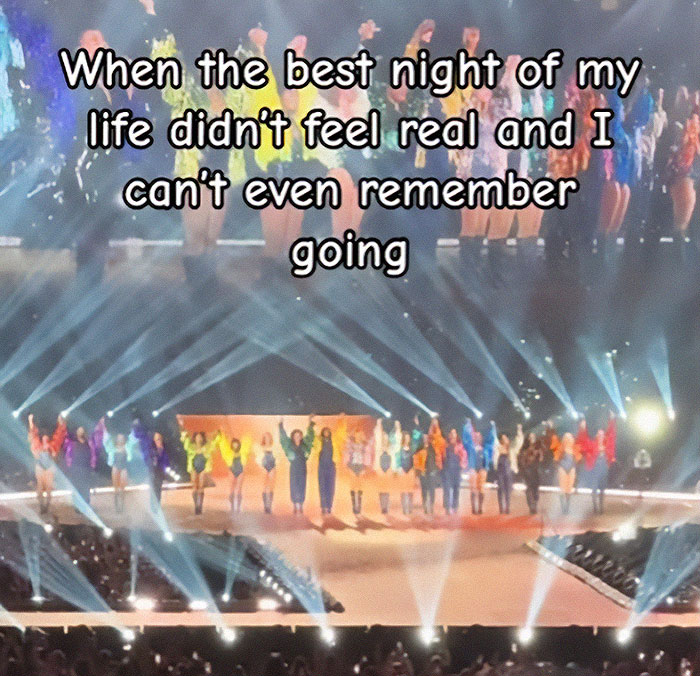
Image credits: user863957292
@metroentertainment Why are @Taylor Swift fans reporting post-concert amnesia? 🤔 After attending the Eras Tour, one fan told @Le Monde: “I can’t remember the color of the outfits she wore, for example. On the other hand, I remember every detail of the way back to my hotel,” And no, this doesn’t mean what you think it does… Have you ever experienced post-concert amnesia? 👆🏼 📲 Follow us for popular entertainment content and more. 🎥: @zachaniff #taylorswift #erastour #eras #ttp #thetorturedpoetsdepartment #midnights #music #pop #musicnews #popmusic #health #wellness #beauty #amnesia #memory #braintok #fyp #foryoupage ♬ original sound – Metro Entertainment
Instead, the doctors believe the phenomenon may be associated with the intense excitement experienced by fans during the eventful night.
Extreme excitement is like stress, and under such conditions, memory encoding may be impaired, explains Dr. Butler.
“In terms of stress events, the body does produce cortisol, which has a facilitatory effect (certainly in rodents) at lower doses, but when it is too high, it actually impacts memory formation,” adds Dr. Miller.
“Obviously, most concerts are not stressful, so most of us enjoy them and can remember a lot from them, but I suppose here (like with the Beatles phenomena in the 60s) that the emotional valence/burden could push cortisol to those levels where it impacts memory formation.”
Instead, experts suggest that the phenomenon could be linked to Swifties’ intense excitement, which the brain could interpret as stress, affecting memory encoding
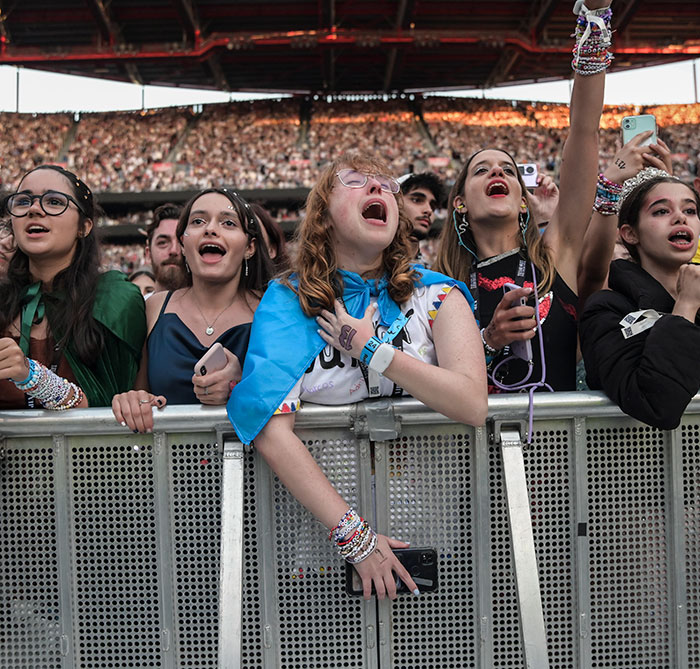
Therefore, this type of “memory loss” is likely psychologically driven, linked to overly stimulating and much-anticipated events like a show from one’s favorite artist.
Taylor Swift will continue delighting fans with the Eras Tour until December 08, 2024, when she will conclude the sixth tour of her career—and the highest-grossing concert tour of all time—in Vancouver, Canada.
“I used to get that from every concert I went to,” a social media user shared


















